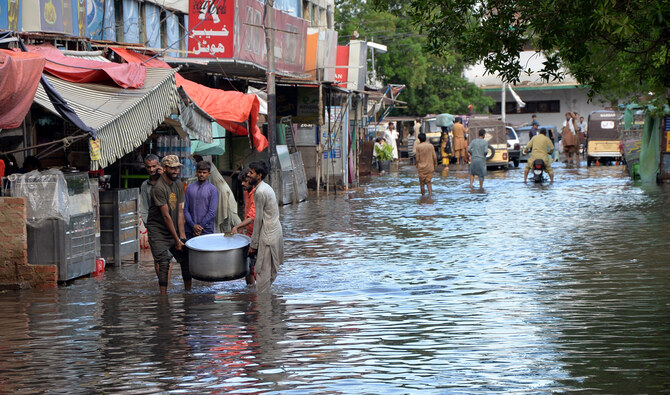ISLAMABAD: A cyclonic storm, ASNA, that developed in the Arabian Sea has steered away from Pakistan’s commercial hub of Karachi, but it may cause “more severe” rains in the country’s southwestern Balochistan province, Pakistani state media reported on Saturday, citing a top weather official.
The weather system, which developed over India’s Rann of Kutch coast, intensified into the cyclonic storm on Friday. It had drifted westward and was lying at about 230 kilometers southwest of Karachi on Saturday, according to the Pakistan Meteorological Department (PMD).
Chief Meteorologist Dr. Sardar Sarfaraz said despite the cyclone’s trajectory toward Oman, it could cause heavy rains and thunderstorms in the Sindh province, where Karachi is located, but the neighboring Balochistan could face more severe consequences.
“Despite Cyclone ASNA’s trajectory toward Oman, its effects on Pakistan will still be significant,” Sarfaraz was quoted as saying by the state-run APP news agency. “Balochistan, in particular, can expect more severe consequences than Sindh, with intense rainfall.”
In Sindh, the cyclone could impact Karachi, Badin, Thatta, Sujawal, Hyderabad, Tando Mohammad Khan, Tando Allah Yar, Matiari and Jamshoro, while heavy rains and thunderstorms could hit the coastal districts of Hub, Lasbela, Awaran, Kech and Gwadar in Balochistan.
Earlier on Saturday, airport authorities in Karachi directed relocation of all aircraft at the Jinnah International Airport amid a cyclone warning.
Pakistan has already been witnessing monsoon rains, which have claimed 29 lives in Balochistan, 88 in Khyber Pakhtunkhwa, 106 in Punjab, 50 in Sindh, four in Gilgit Baltistan and eight in Azad Jammu Kashmir, according to the National Disaster Management Authority. No loss of lives has been reported in the capital city, Islamabad, so far.
Heavy rains triggered flash floods in Karachi on Friday, causing power outages and closure of schools in the city. A PMD alert on Saturday said heavy rains could inundate low-lying areas of the Makran coast in Balochistan, with sea conditions likely to remain rough.
Pakistan has seen erratic changes in its weather patterns in recent years that scientists have blamed on climate change. This year, the South Asian country recorded its “wettest April since 1961,” with 59.3 millimeters of rainfall, while some areas of the country faced deadly heat waves in May and June.
In 2022, unusually heavy rains triggered floods in many parts of the country, killing over 1,700 people, inflicting economic losses of around $30 billion, and affecting at least 30 million people.
Cyclone ASNA steers away from Karachi, may cause ‘more severe’ rains in Balochistan — official
https://arab.news/8x5nz
Cyclone ASNA steers away from Karachi, may cause ‘more severe’ rains in Balochistan — official

- The weather system has drifted westward and lies at about 230 kilometers southwest of Karachi
- It may cause heavy rains, thunderstorms in Balochistan’s Hub, Lasbela, Awaran, Kech and Gwadar
Pakistan’s Khyber Pakhtunkhwa calls for talks with Afghanistan to address militancy

- The provincial administration held a meeting with religious and political leaders to discuss the issue
- Chief Minister Gandapur says a jirga will be formed for result-oriented negotiations with Afghanistan
PESHAWAR: The administration of Pakistan’s militancy-hit northwestern Khyber Pakhtunkhwa (KP) province on Saturday called for government-level negotiations with Afghanistan, announcing that it would constitute a jirga, or a traditional tribal council, to engage with authorities in Kabul, according to an official statement.
The statement followed a consultative meeting convened by the KP administration under the title “National Unity Against Terrorism,” bringing together representatives from various religious and political parties. The discussions come amid a sharp rise in militancy in the region, including suicide bombings, attacks on civilians and security forces and kidnappings of local businessmen and government functionaries.
Pakistan’s top military and political leadership has blamed the surge in violence on Tehreek-e-Taliban Pakistan (TTP) militants launching cross-border attacks from Afghanistan, accusing Kabul’s administration of harboring and facilitating them, though the allegation is denied by the Afghan authorities.
The country’s security forces have also conducted intelligence-based operations against militant hideouts in KP and has reportedly launched airstrikes inside Afghanistan to target TTP militants. However, the consultative session in KP called for a more peaceful approach, seeking the government to engage in constructive talks with Afghan authorities.
“The security situation in our province is directly linked to developments in neighboring Afghanistan,” Chief Minister Ali Amin Gandapur said, according to an official statement circulated after the meeting.
“To find a lasting solution to the issue of terrorism in the country, there is a need for government-level negotiations with Afghanistan,” he added.
“A jirga will be formed to hold meaningful and result-oriented negotiations with Afghanistan,” Gandapur said, referring to the traditional tribal assembly system used for conflict resolution and decision-making in Pashtun-majority areas.
KP’s administration is run by former prime minister Imran Khan’s Pakistan Tehreek-e-Insaf (PTI) party, which has historically advocated negotiations with TTP to resolve militant violence.
The federal government in Islamabad, however, argues that past talks with militants only allowed them to regroup and launch more deadly attacks against Pakistan’s security interests.
Islamabad has repeatedly pressed Kabul to eliminate TTP sanctuaries inside Afghanistan, while the Afghan Taliban have called for dialogue instead of military action.
Pakistani and Saudi finance chiefs discuss boosting strategic ties ahead of AlUla conference

- Muhammad Aurangzeb brings up enhanced bilateral trade, investments and collaboration with his counterpart
- The ministers emphasize the need for continued economic dialogue, increased cooperation through joint initiatives
KARACHI: Saudi Arabia and Pakistan on Saturday discussed unlocking the full potential of their strategic relationship, as the finance chiefs of both countries met ahead of the Emerging Markets Conference in AlUla, Saudi Arabia, according to an official statement.
Pakistan’s Finance Minister Muhammad Aurangzeb arrived in the Kingdom to attend the two-day conference, which begins on Sunday, at the invitation of his Saudi counterpart Mohammed Al-Jadaan.
The annual economic policy forum is organized by the Saudi finance ministry in collaboration with the International Monetary Fund (IMF) regional office in Riyadh. The event will bring together emerging market finance ministers, central bank governors, policymakers, public and private sector leaders, international institutions and academics.
“The meeting [between the two finance chiefs] underscored a shared commitment to build bridges of economic cooperation and advance mutual prosperity,” Pakistan’s finance ministry said in a statement after Aurangzeb’s interaction with Al-Jadaan.
“The discussions highlighted opportunities for enhancing bilateral trade, investments and financial collaboration, with both ministers expressing their dedication to unlocking the full potential of their countries’ strategic partnership,” it added.
Pakistan is navigating a fragile economic recovery under a $7 billion IMF loan program secured in September 2024, after implementing austerity measures and policy reforms to avert a sovereign default in 2023.
To facilitate Pakistan’s economic recovery, Saudi Arabia signed 34 memorandums of understanding (MoUs) worth $2.8 billion last October to boost private sector investment in key areas, including energy, infrastructure and technology.
During their meeting, the two ministers explored avenues for collaboration in infrastructure, energy, technology and finance, emphasizing the need for continued dialogue and joint initiatives to facilitate investment flows and economic opportunities that could benefit the broader region.
According to an earlier statement by Pakistan’s finance ministry, Aurangzeb is scheduled to participate in a high-level panel discussion titled “The Path to Emergent Markets,” hosted by IMF Managing Director Kristalina Georgieva.
The conference will feature nine sessions, with 200 participants and 36 speakers, focusing on economic resilience, financial policies for emerging markets and global economic challenges.
The discussions come at a time when the world economy is facing persistent shocks, trade tensions between major world powers, geopolitical instability and tight financial conditions.
“The conference will provide a unique platform for world leaders to discuss and analyze domestic, regional and global economic conditions and developments and to exchange ideas on solutions to global challenges,” the Pakistani finance ministry added.
Pakistan, Saudi military officials agree to deepen defense and security ties

- General Sahir Shamshad Mirza is in Saudi Arabia for the Joint Military Cooperation Committee meeting
- His discussions with Saudi officials focused on military exchange programs, ongoing training initiatives
KARACHI: Senior Pakistani and Saudi military officials have agreed to further consolidate bilateral defense and security cooperation during their meetings in the Kingdom, the Inter-Services Public Relations (ISPR) said in a statement on Saturday.
Pakistan’s Chairman Joint Chiefs of Staff Committee General Sahir Shamshad Mirza is currently visiting Saudi Arabia to attend the 8th round of the Pakistan-Saudi Joint Military Cooperation Committee (JMCC) meeting.
The Kingdom remains one of Pakistan’s key defense and security allies, with ties encompassing a range of activities, including counterterrorism collaboration.
“Both sides reviewed the ongoing cooperation between Armed Forces of Pakistan and Saudi Arabia, focusing on mutual exchange programs, training initiatives and other defense-related activities,” the ISPR said.
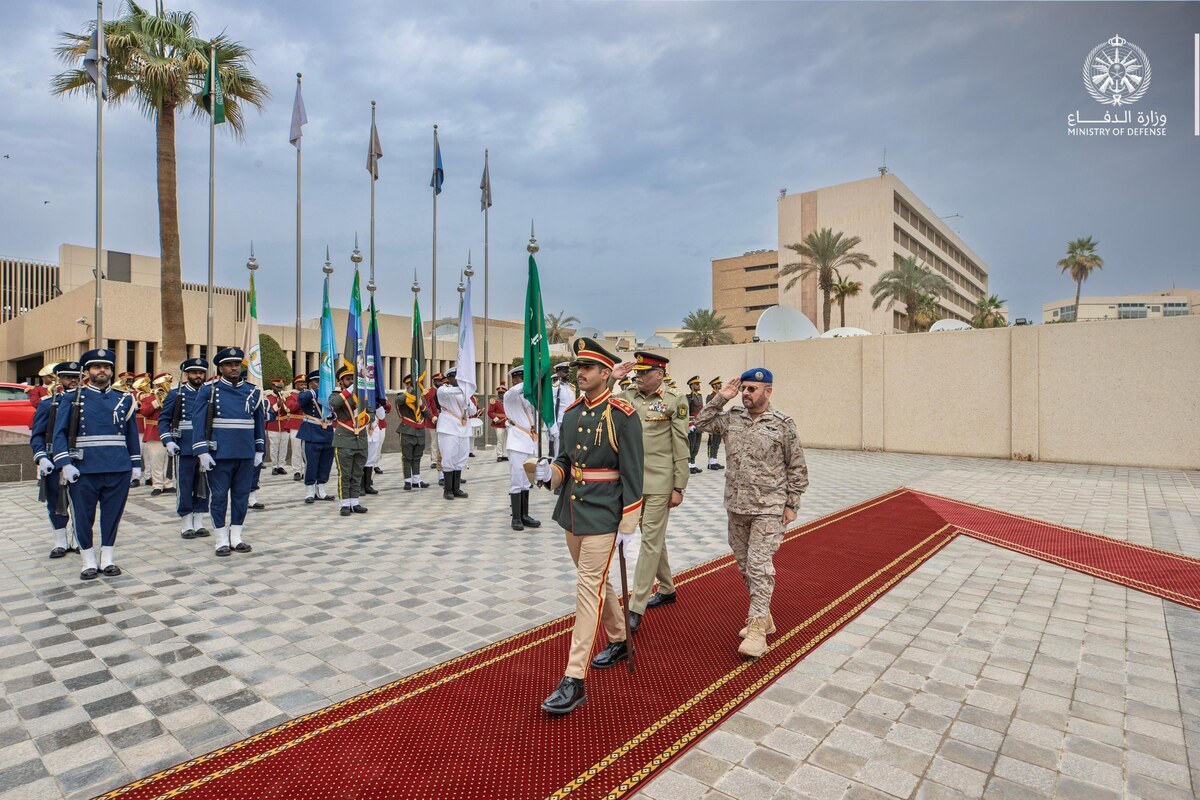
“The military leadership reaffirmed their commitment for further strengthening existing defense and security cooperation between the two brotherly countries,” it added.
During his visit, General Mirza held meetings with Major General Talal Bin Abdullah Al-Otaibi, Assistant Minister of Defense, and General Fayyadh bin Hamed Al-Ruwaili, Chief of General Staff of Saudi Arabia.
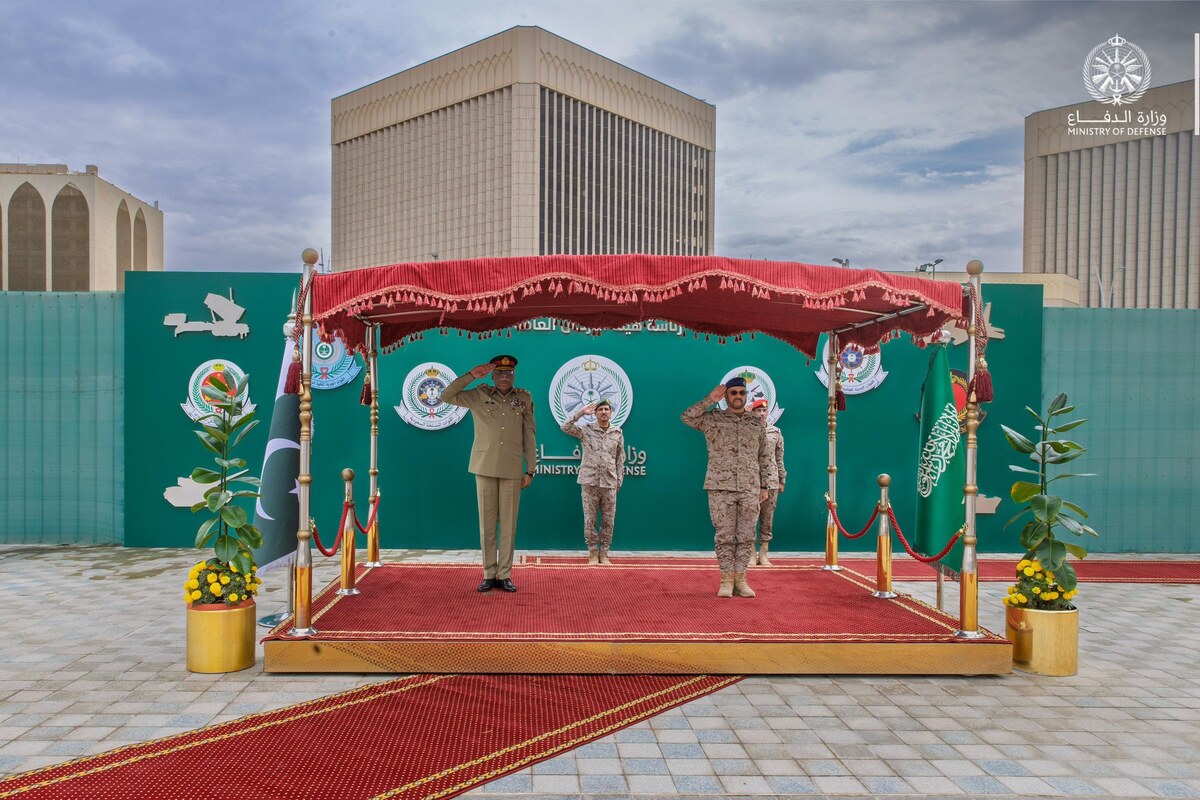
Their discussions covered strategic and security issues, the evolving regional environment and bilateral defense collaboration.
The JMCC meeting, which Mirza and Al-Ruwaili co-chaired, serves as a key platform for defense dialogue and coordination between the two nations.
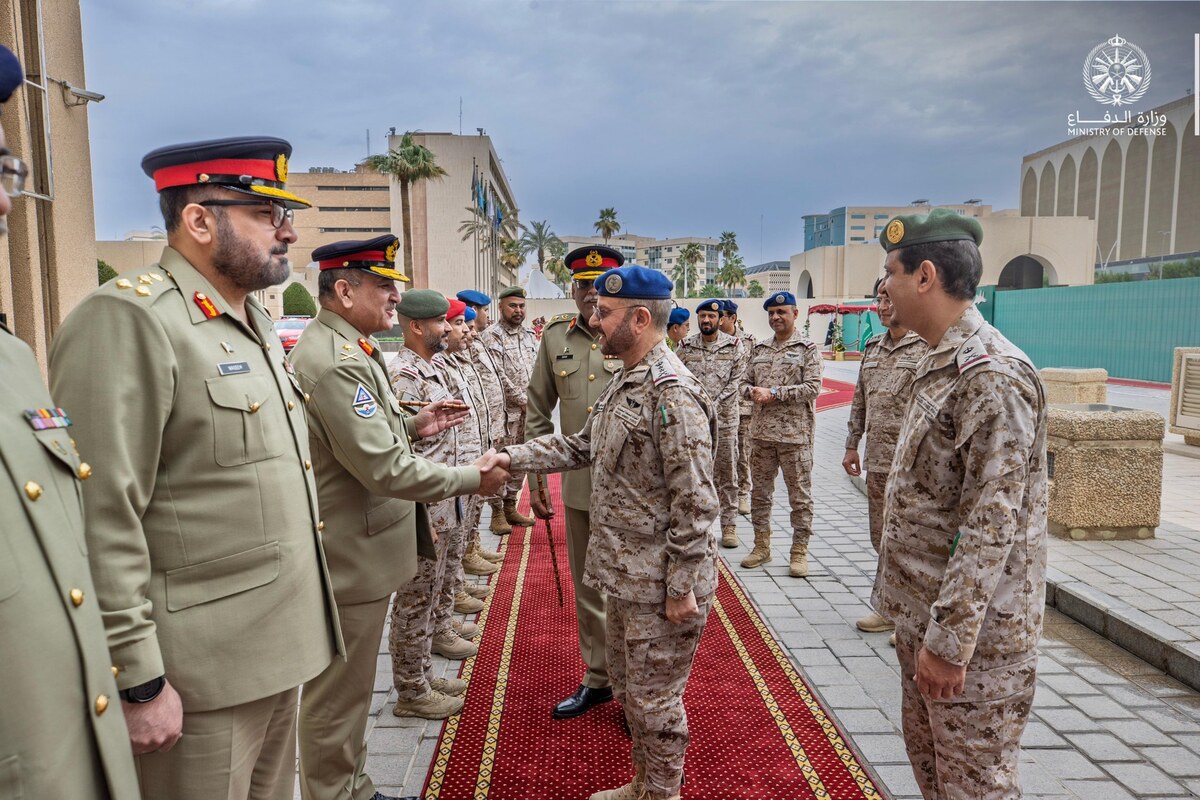
The ISPR said Saudi military officials praised the professionalism of Pakistan’s armed forces and acknowledged their sacrifices in the fight against militancy.
Upon his arrival at the Armed Forces Headquarters in Saudi Arabia, General Mirza was given a Guard of Honor by a smartly turned-out military contingent, reflecting the strong defense ties between the two nations.
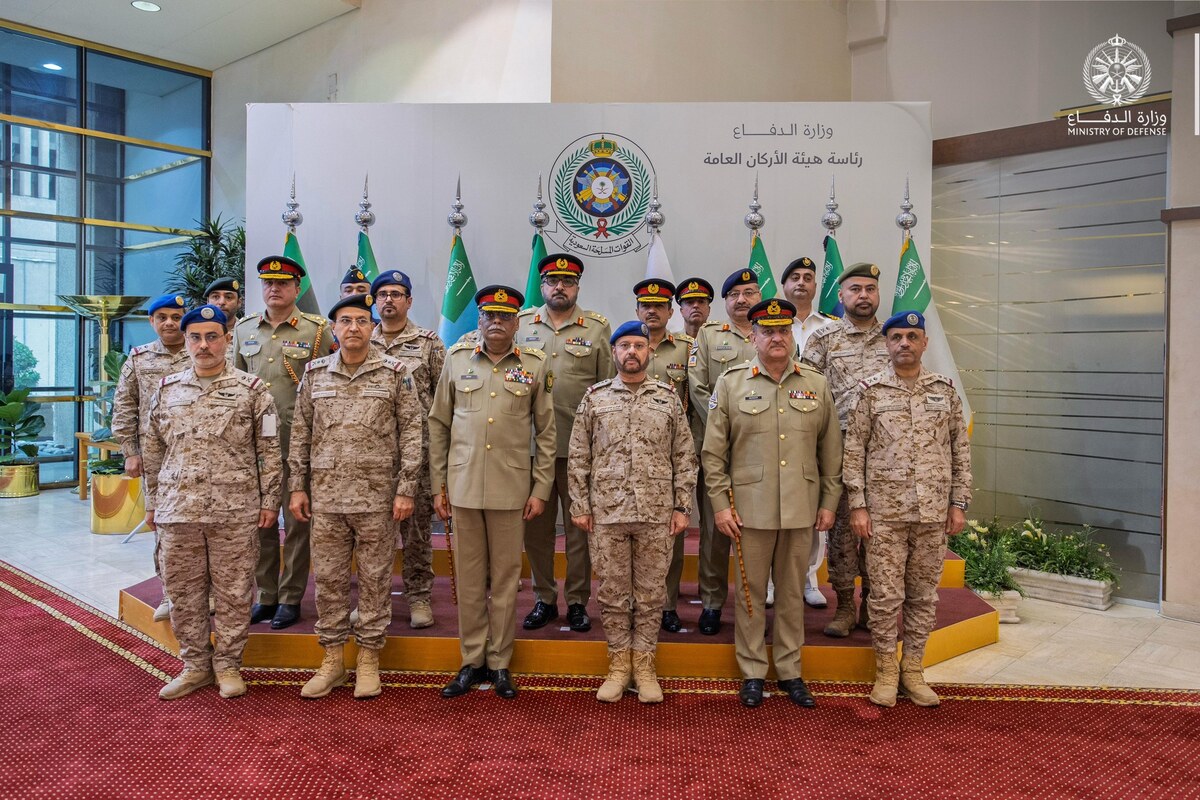
Pakistan’s interior minister calls for global unity against militant violence in meeting with US envoy

- Mohsin Naqvi expresses optimism that Pakistan-US ties will strengthen under President Donald Trump
- His recent meetings with US lawmakers focused on combating militancy, strengthening bilateral ties
ISLAMABAD: Pakistan’s Interior Minister Mohsin Naqvi on Saturday described militant violence as an international challenge, calling for global solidarity to combat the threat during a meeting with US Chargé d’Affaires Natalie Baker.
Baker assumed the role at the US Embassy in Islamabad in January, following the departure of Ambassador Donald Blome. The position is a temporary appointment, with her responsibilities including engagement with Pakistani officials on bilateral issues until a new envoy is confirmed.
“Terrorism is an international issue, and the global community must work together to address it,” Naqvi said during the meeting.
He also recalled his recent official visit to the United States, which took place earlier this month. The trip focused on bilateral cooperation, counterterrorism strategies and security concerns.
“The meetings with US Congress members were extremely positive,” the minister said. “Discussions focused on developing a joint strategy to combat terrorism and further strengthening bilateral relations.”
Pakistan and the US have historically cooperated on counterterrorism efforts, with both sides benefiting from intelligence-sharing support.
More recently, the US has repeatedly expressed support for Pakistan’s security concerns, particularly as Islamabad blames rising militant violence on cross-border attacks from Afghanistan — an allegation denied by authorities in Kabul.
Naqvi expressed optimism that Pakistan-US relations would strengthen under President Donald Trump’s administration.
He also invited Baker to attend Islamabad’s upcoming spring festival celebrations.
Pakistan army says officer, three soldiers killed in anti-militant operations in northwest

- Security forces killed 15 Pakistani Taliban in two separate operations in Dera Ismail Khan and North Waziristan
- The militants were involved in numerous violet activities in the area and were wanted by law enforcement agencies
ISLAMABAD: An officer and three soldiers were killed on Saturday as security forces launched two separate operations against militants in Pakistan’s northwest, the military’s media wing, Inter-Services Public Relations (ISPR), said in a statement.
The intelligence-based operations took place in Hathala, Dera Ismail Khan District, and Miran Shah, North Waziristan District. Both the areas, along with the rest of Khyber Pakhtunkhwa province, have seen a surge in militant violence since the collapse of a fragile ceasefire agreement between the government and the banned Tehreek-e-Taliban Pakistan (TTP) in late 2022.
Pakistan brands TTP fighters as “khwarij,” a historical reference to an extremist sect in early Islam known for rebelling against authority, declaring other Muslims as apostates, and justifying their killing.
“An intelligence-based operation was conducted by the Security Forces in general area Hathala, Dera Ismail Khan District, on reported presence of Khwarij,” the ISPR said. “During the conduct of operation, own troops effectively engaged the khwarij location and resultantly, nine khwarij including Kharji ring leaders HVT [high-value targets] Farman [alias] Saqib, Kharji Amanullah [alias] Toori, Kharji Saeed [alias] Liaqat, and Kharji Bilal were sent to hell.”
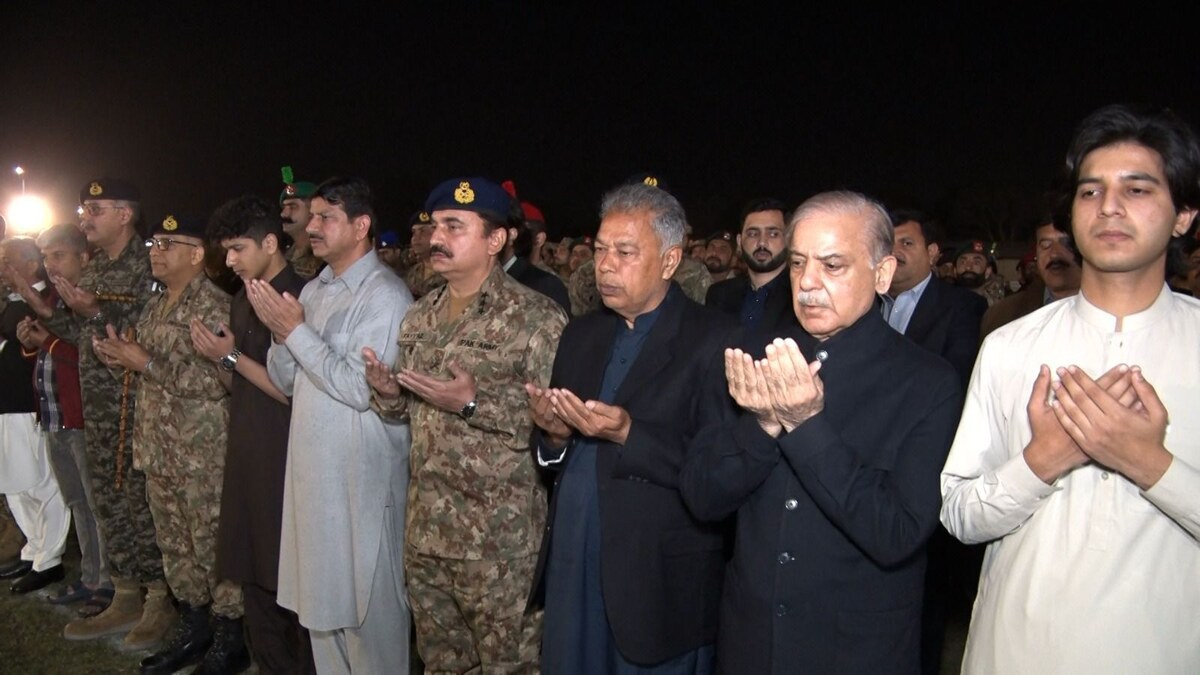
The statement added all these militants were involved in numerous violet activities and were wanted by law enforcement agencies.
“In another operation conducted in general area Miran Shah, North Waziristan District, six khwarij were effectively neutralized by the security forces,” the statement continued.
“However, during intense fire exchange, Lt. Muhammad Hassaan Arshaf (age: 21 years, resident of District Lahore) leading his troops from the front, fought gallantly and embraced Shahadat along with his three men,” it added.
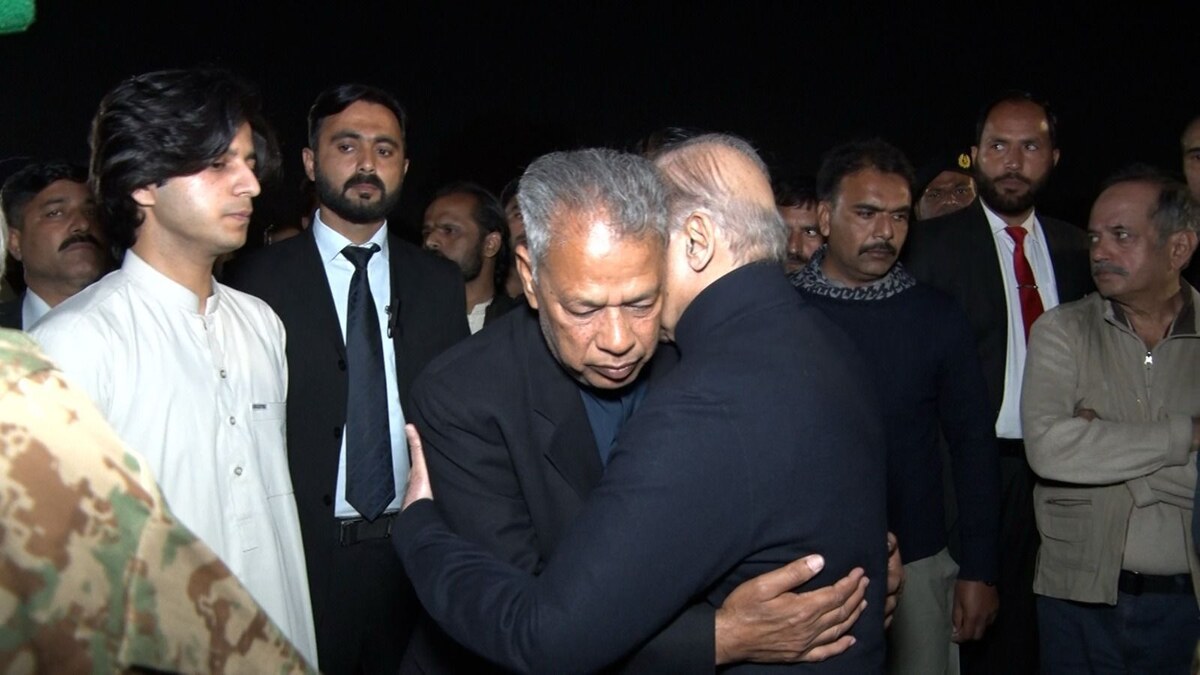
The military said sanitization operations were underway to clear any remaining militants, reiterating its determination to eliminate militancy from the region.
The Pakistani military has intensified operations against TTP hideouts, vowing to wipe out the group, which Islamabad accuses of carrying out cross-border attacks from Afghanistan. The Taliban-led government in Kabul, however, denies providing safe havens to Pakistani militants.


